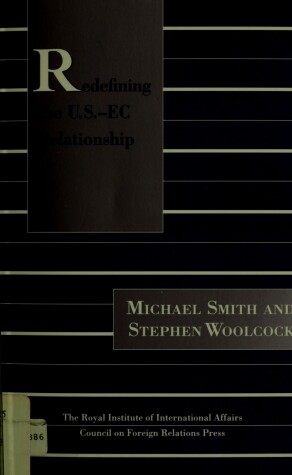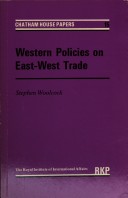Chatham House Papers
6 total works
Direct Investment and European Integration
by Stephen E Thomsen and Dr. Stephen Woolcock
Published 6 May 1993
Direct investment is increasingly shaping the economic geography of Europe. Understanding the motives behind firms' investment decisions provides vital clues to the nature of the compeititon among firms and also among governments seeking to attract FDI. The authros document the rapid rise in intra-European investment in the 1980s and examine the various economic and policy variables that influence the pattern of investment in Europe by both European and non-European firms. They question both the impact of investment in helping to bring about policy convergence and the need for national governments to change policies in order to accommodate inward investors. The study also suggests policies that take into account the essential role that investment plays in European integration.
Political Dimensions of the EC-US Relationship
by Michael Smith and Dr. Stephen Woolcock
Published 1 January 1993
In the period 1989-91 Europe has undergone fundamental political change. Soviet communism has collapsed, the countries of central and eastern Europe have begun a process of reform, Germany has been unified and the European Community has set a course for monetary and political union. Less dramatic but no less important for transatlantic relations are the changes taking place in the United States. The US is left as the sole military superpower but has an economy facing major structural problems and in the process of relative decline. This volume considers what role the putative European Union will play in the international economic and political orders and how this influences and is influenced by US responses to the end of the Cold War and its own relative economic decline. Having set out these changes in the political environment, the volume then focuses on how European and American responses to them affect the transatlantic relationship. It concludes that a major reappraisal of this relationship is needed if it is to remain strong and vital throughout the 1990s.
Market Access Issues in European Community and United States Relations
by Dr. Stephen Woolcock
Published 27 November 1991
In recent years transatlantic trade tensions have grown. The United States has viewed the EC as creating a fortress, while Europe has looked on with increasing alarm at what it sees as a progressive shift from multilateralism towards unilateralism in the US. These tensions have been exacerbated by conflicts over how to develop the multilateral trading system - as reflected in the heated negotiations between the US and the EC in the GATT Uruguay Round. This study analyzes the underlying issues behind such trade disputes. Rather than focusing on specific trade conflict, it discusses how open the two markets really are and what problems need to be overcome. It finds that, despite the bitter political battle, transatlantic economic interdependence continues to grow. Drawing on a number of key sectors, it shows how the pace of this interdependence is being slowed by the lack of progress in policy-making, in terms of establishing the framework within which trade and investment should take place. There is therefore a danger of divergences developing that would threaten the future growth of transatlantic trade and investment.
Britain and Germany, 1992
by Dr. Stephen Woolcock, Michael Hodges, and Kristin Schreiber
Published 1 January 1990
This volume is the result of an 18-month research project conducted by the Royal Institute of International Affairs, London and the Institut fur Europaische Politik, Bonn, which addressed two main questions: what kind of European market will emerge as a result of the 1992 process? and what impact will this have on the established national approaches to the regulation markets of Britain and Germany? The findings are based on over 150 interviews with companies, trade unions, and policymakers in Britain and Germany. There are five case-studies of areas in which 1992 will have a highly significant impact: mergers and acquisitions, public procurement, technical standards and certification, telecommunication, and financial services. The volume shows that 1992 will result in a net deregulation of European markets in these areas, but it also indicates where new European-level regulation is needed if the objectives of the single market are to be realized. It compares the German and British national approaches to market regulation and finds important differences.
However, market integration, accelerated by the 1992 process, is bringing about a slow but sure convergence of the two countries' attitudes.
However, market integration, accelerated by the 1992 process, is bringing about a slow but sure convergence of the two countries' attitudes.



